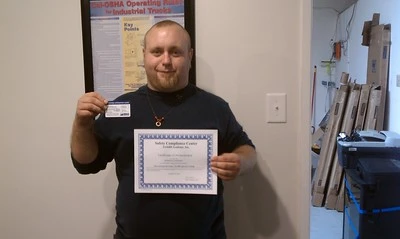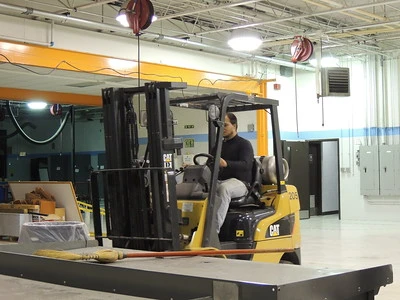Forklift Certification in Alabama (How To Get Certified)
May 7, 2024 | by onlineoshasafetytraining.com


If you’re looking to operate a forklift in Alabama, you’ll need to get certified first. This might sound a bit daunting, but it’s really just about learning how to use a forklift safely and effectively.
In this article, we’ll walk you through the steps to get your forklift certification, from finding the right training program to what you can expect during the certification process. Whether you’re aiming for a new job or need the certification for your current role, we’ve got you covered with all the essentials to get you properly trained and legally ready to operate a forklift.
Understanding Forklift Certification
What is forklift certification? Forklift certification is like getting a driver’s license but for operating a forklift. It’s a special training that teaches you how to safely drive and handle a forklift at work. When you finish the training, you get a certificate that says you know how to use a forklift properly.
Who needs to be certified? If you want to drive a forklift on the job, you need to be certified. It’s important for anyone who operates a forklift, whether you work in a warehouse, a construction site, or any place where forklifts are used. This ensures that you and everyone around you stays safe while you’re driving the forklift.
Do You Need a Forklift License in Alabama?

In Alabama, just like in a football game where players need to know the rules to play, anyone operating a forklift needs to have a license. It’s not just a piece of paper; it’s your ticket to legally operate heavy machinery and make sure everyone stays safe on the job site.
Here’s how it goes: Imagine you’re eager to start a new job at a warehouse. You see a forklift and think, “I can drive that, no problem!” But not so fast! You can’t just hop on and start lifting pallets. First, you need to get your forklift certification. This isn’t just any training; it involves understanding OSHA 1910.178 – Powered industrial trucks standards, which are like the rulebook everyone follows to avoid penalties and, more importantly, accidents.
You’ll go through a course where you learn the ropes, from the basic controls to more complex maneuvers like stacking and tiering loads. You’ll get hands-on practice under the guidance of a seasoned instructor, who’ll make sure you know how to operate the lift, perform pre-operational checks, and navigate through tight aisles without causing chaos.
After completing the training and passing the tests, you’ll earn your certification. It’s a bit like passing your driving test, but for a powerful machine that can lift thousands of pounds. This license isn’t just a formality; it’s your proof that you know what you’re doing, keeping you and everyone else safe at work.
So, yes, you do need a forklift license, not just to comply with the law but to ensure that you’re up to the task of handling heavy machinery responsibly and safely.
It’s a Legal Requirement in Alabama
In Alabama, it’s mandatory for forklift operators to be certified in line with the standards set by the Occupational Safety and Health Administration (OSHA). Certification ensures that operators are trained in safe operation practices, reducing the risk of workplace accidents. The state enforces OSHA’s regulations which require forklift certification to be renewed every 36 months to maintain safety and compliance standards.
The legal requirements include training in safe driving, handling and loading, operating in hazardous environments, and emergency procedures. Relevant laws emphasize the importance of operators understanding these regulations to operate safely and efficiently.
Non-compliance with these certification requirements can result in severe penalties. Employers who allow uncertified employees to operate forklifts can face fines up to $10,000. This underscores the importance of maintaining up-to-date certification to avoid legal issues and enhance workplace safety
Here’s The Process To Undergo To Get Certified
Getting forklift certified involves a few clear steps, and understanding these can help you navigate the process smoothly. Here’s a breakdown in layman’s terms, including some industry-specific terms you might encounter:
1. Choose a Training Program

- OSHA Compliance: The training program must adhere to the guidelines established by the Occupational Safety and Health Administration (OSHA). This ensures that the training covers essential safety protocols and operational procedures that are crucial for safe and effective forklift operation. Compliance with OSHA standards helps minimize workplace accidents and legal issues related to forklift operation.
- Program Types: Training programs can be online or in-person. Online courses offer flexibility and convenience, allowing you to complete the training at your own pace and often at a lower cost. In-person courses provide direct interaction with instructors and can be more hands-on, which might be beneficial for complete beginners or those who prefer a structured learning environment.
2. Complete Formal Training
- Course Content: The formal training typically includes a combination of theoretical classroom learning and practical exercises. You will learn about the mechanics of forklifts, safe operating practices, load handling, and how to navigate through confined spaces, which are common in warehouses and industrial environments.
- Learning Materials: These often include instructional videos, written materials, and direct instruction from certified trainers. The goal is to provide a comprehensive learning experience that prepares you for both the written and practical aspects of forklift operation.
3. Hands-On Training
- Practical Experience: Regardless of the initial training format (online or in-person), practical, hands-on experience is essential. This part of the training is usually conducted at a designated training facility or at your workplace under the supervision of a qualified trainer.
- Skill Development: During hands-on training, you will practice driving a forklift, maneuvering it with various loads, and conducting pre-operation safety checks. This experience is crucial for building confidence and competence in handling a forklift safely.
4. Evaluation and Testing
- Written Test: This test assesses your knowledge of what you’ve learned during the theoretical part of the training. It typically covers forklift operation, safety procedures, and OSHA regulations.
- Practical Test: This is a hands-on evaluation where you demonstrate your ability to operate a forklift safely. You’ll need to show proficiency in tasks such as driving, loading, and unloading, as well as performing safety checks.
5. Certification
- Receive Your Certificate: Once you pass both the written and practical tests, you will receive a forklift operation certificate, which officially certifies you as a trained forklift operator. This certificate is usually valid for three years.
- Certification Card: Along with your certificate, you will also receive a certification card, which serves as a portable proof of your qualification. This card is useful for job applications and inspections at workplaces.
6. Recertification
- Periodic Renewal: OSHA requires that forklift certifications be renewed every three years to ensure that operators are up-to-date with the latest safety protocols and operation techniques. This may involve taking a refresher course and passing the tests again.
- Additional Training: If you are involved in an accident, or if there are significant changes in your working conditions or the type of forklift you operate, you might need additional training to ensure continued safety and compliance.
Duration and Cost:
- Duration: The duration of forklift certification courses can vary. Typically, a full course can be completed in one day or less. Some online courses can be completed in about 2 hours if you’re experienced, though beginners might need more time.
- Cost: The cost also varies. Online courses might start as low as $38, but in-person training, which often includes more comprehensive instruction, can be more expensive.
Choosing a Training Provider and Program
When choosing a forklift training program in Alabama, it’s important to consider several key factors to ensure that the training you receive is comprehensive and compliant with Occupational Safety and Health Administration (OSHA) regulations. Here are some essential points to keep in mind:

- OSHA Compliance: Ensure the program adheres to OSHA guidelines. This guarantees that the training covers all necessary safety protocols and operational procedures required for forklift operation.
- Accreditation and Reputation: Look for programs that are well-regarded in the industry and have proper accreditation. This can often be verified through reviews or industry endorsements.
- Program Content: A good training program should cover forklift fundamentals, inspection, load handling, safe driving, and stability. It should include both theoretical and practical training sessions to provide a well-rounded understanding of forklift operation.
- Certification Validity: Check that the certification provided by the training program is recognized in Alabama and ideally, nationwide. This ensures your certification is accepted by employers across different states.
- Training Flexibility: Consider whether the training is available online or in-person, depending on your schedule and learning preference. Online courses offer flexibility, whereas in-person sessions provide hands-on experience.
- Post-Training Support: Some providers offer support even after the training is complete, which can be crucial for continuous learning and handling on-the-job challenges.
- Cost and Duration: Training costs and durations can vary. Some courses can be completed within hours online for a lower cost, while in-person training might be more expensive and take longer but provide deeper learning experiences.
Recognized Training Providers in Alabama
| Training Provider | Address | Contact Information |
|---|---|---|
| Alabama Workforce Training Center | 3500 6th Avenue South, Birmingham AL 35222 | Tel: 205-719-3220, Email: awtcinfo@aidt.edu |
| Goodwill Gulf Coast | 2440 Gordon Smith Dr, Mobile AL 36617 | Tel: (251) 471-1581 |
| Crane U | 7460 Frisco Ave, Leeds, AL 35094 | Tel: (855) 927-2638, Local: (205) 478-2050 |
| Forklift Systems | Birmingham, AL (Specific address not listed) | Tel: 1-800-752-1882 |
Renewing Your Certification
When to Renew Your Certification: Forklift certifications are not valid indefinitely. Typically, you need to renew your certification every three years. It’s important not to let your certification expire because operating a forklift without a valid certification can lead to penalties and safety hazards at work.
How to Renew Your Certification: To renew your forklift certification, you usually need to go through a renewal process which might involve:
- Refresher Training: Even if you’ve been operating a forklift safely for years, a refresher course helps to ensure you’re up to date with the latest safety guidelines and operational procedures.
- Evaluation: Some programs require a practical evaluation to demonstrate that you can still operate a forklift safely.
- Re-Testing: Depending on the training provider or your employer’s requirements, you might need to retake the written test to confirm your knowledge of forklift operations and safety protocols.
Continuing Education and Skills Updating
Importance of Continuing Education: Continuing education is crucial in forklift operation because it helps you stay informed about the latest safety regulations, technological advances in forklift design, and best practices in warehouse operations. Regular updates can reduce the risk of accidents and increase efficiency on the job.
How to Update Your Skills:
- Periodic Training Sessions: Attend training sessions provided by your employer or training providers. These sessions might include hands-on training with new equipment or simulations of emergency scenarios.
- Online Courses: Many organizations offer online courses that you can take to refresh your knowledge without having to attend in-person training. These are convenient and can often be completed at your own pace.
- Workshops and Seminars: Participate in workshops or seminars that focus on specific aspects of forklift operation, such as safety protocols, maintenance checks, or advanced operational techniques.
Renewing your certification and continuing your education in forklift operation are key to maintaining a safe working environment and advancing your career in material handling.
Salary of Forklift Operators in Alabama
As of April 24, 2024, the average salary for a forklift operator in Alabama is $38,686. However, salaries can range from $34,767 to $43,852. This variation depends on several factors such as the city you work in, your level of education, any special certifications you have, other skills you might possess, and how long you’ve been working in your field.
Getting a job as a forklift driver n this state involves a few key steps to ensure you are qualified and prepared. Here’s a straightforward guide on how to start your career as a forklift driver in the state:
- Obtain Forklift Certification:
- Training: First, you need to be certified to operate a forklift. Look for accredited training programs that offer the necessary training to pass the certification exam. These programs typically cover operating techniques, safety procedures, and laws related to forklift operation.
- Certification Exam: After completing the training, you will need to pass a certification exam which usually includes both a written test and a practical driving test.
- Gain Experience:
- If you’re new to forklift driving, you might start in a position that requires less skill and work your way up. Some employers offer on-the-job training, allowing you to gain experience while working under supervision.
- Consider temporary or part-time roles to build your experience if direct positions are scarce.
- Prepare Your Resume:
- Highlight any relevant experience and skills, including your forklift certification and any other machinery you are skilled in operating. Also, include any safety training courses you have completed.
- Tailor your resume to the job you’re applying for, emphasizing your reliability and efficiency.
- Search for Job Openings:
- Online Job Boards: Websites like Indeed, LinkedIn, and Monster regularly list forklift operator positions.
- Company Websites: Visit the careers section of websites for warehouses, construction companies, manufacturing plants, and other businesses that frequently use forklifts.
- Staffing Agencies: Some agencies specialize in temporary and permanent placements for industrial and manufacturing sectors.
- Apply for Jobs:
- Apply for positions that match your skills and experience. Be sure to follow any application instructions carefully and customize your application materials for each job.
- Prepare for Interviews:
- Be ready to discuss your forklift operating experience, understanding of safety procedures, and any situations where you have successfully handled workplace challenges.
- It’s also helpful to have a few questions prepared about the company’s safety culture and opportunities for ongoing training and development.
- Consider Additional Certifications:
- While not always necessary, additional certifications for different types of forklifts or advanced safety training can make you a more attractive candidate and potentially lead to higher-paying roles.
To Make a Conclusion
In Alabama, getting your forklift certification is a big deal if you want to work safely and move ahead in jobs that use forklifts. By finishing the right training and keeping your certification fresh, you’re not just following the rules—you’re also making sure you and your coworkers stay safe. Keep in mind, being a certified forklift driver helps you do your job better and keeps everyone around you safe too.
So, if you’re planning to operate a forklift or you’re already on the job but need to update your skills, remember to take your training seriously. Every three years, renew that certification to keep your knowledge and skills sharp. This not only helps you stay safe but also keeps you valuable and competitive in the workforce. Think of forklift certification as a key tool in your job toolbox—one that opens up opportunities and keeps you and your team working efficiently.
RELATED POSTS
View all


